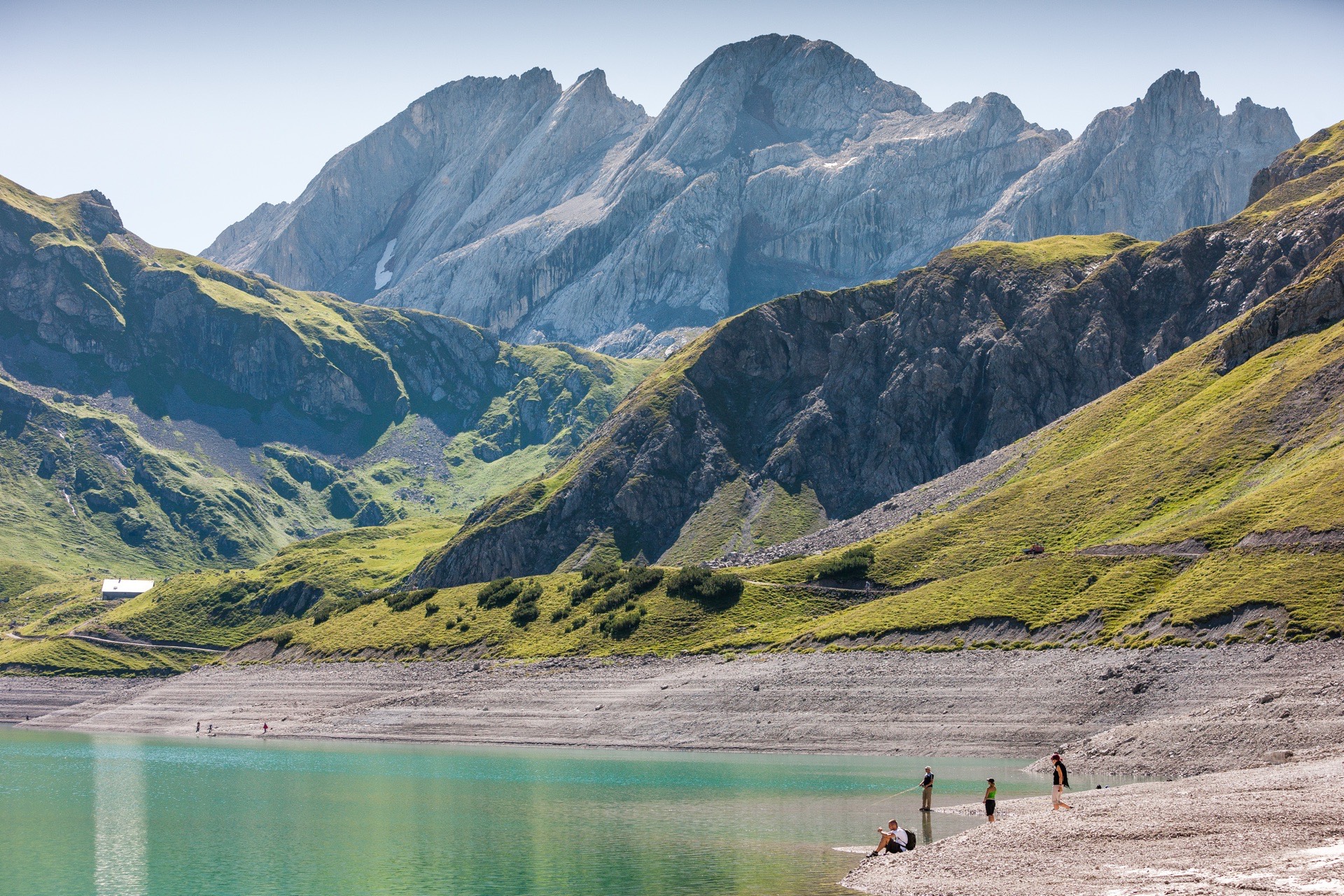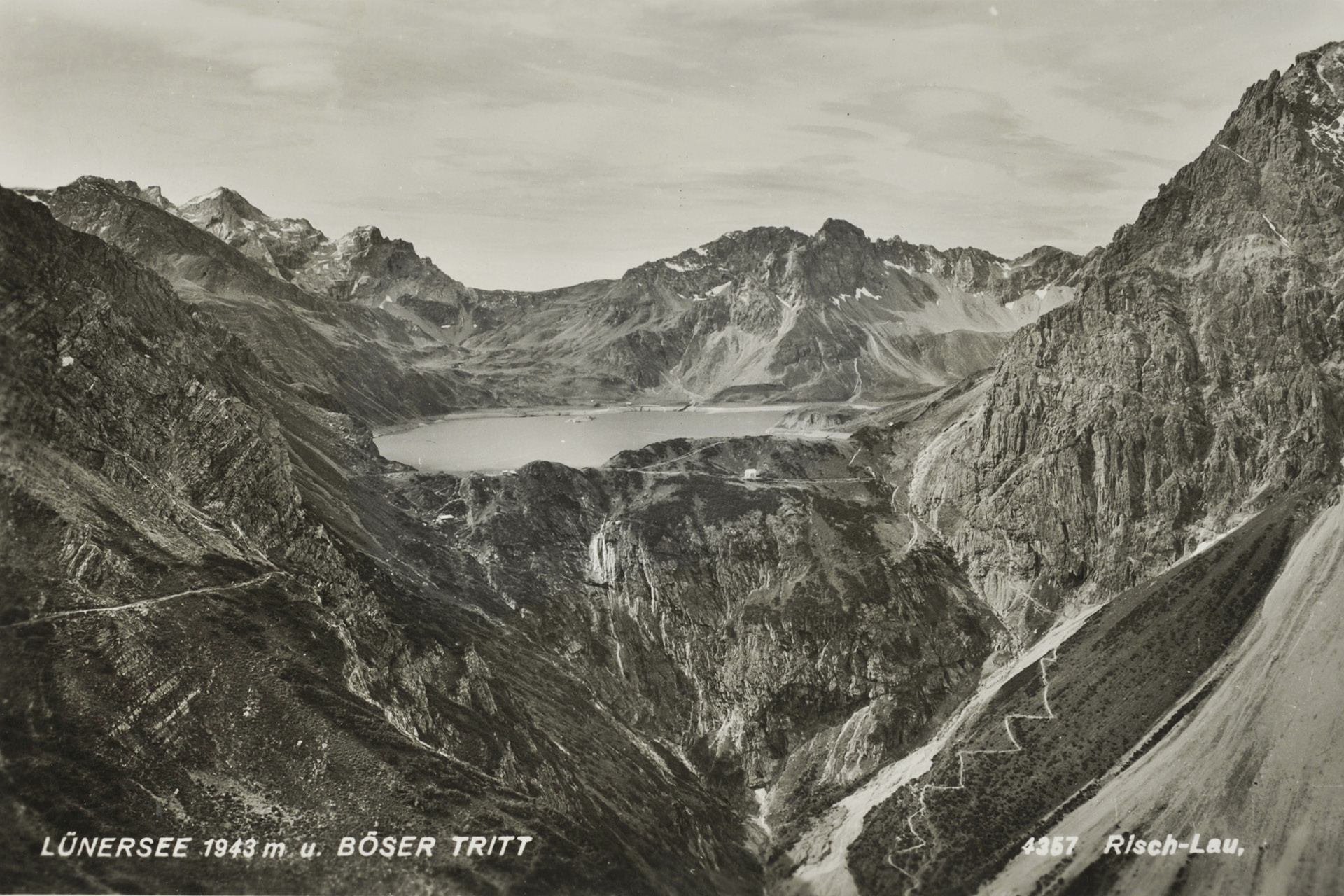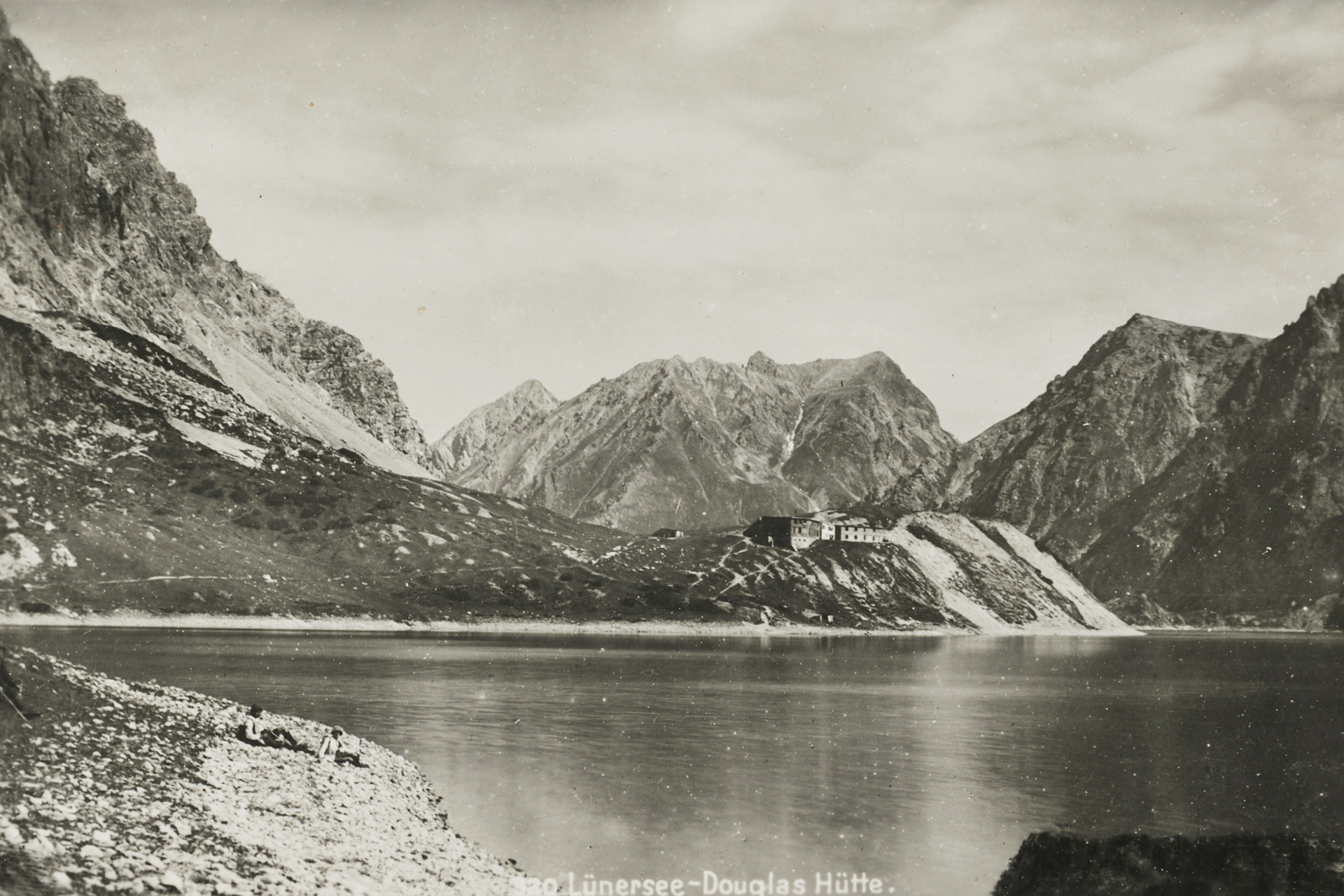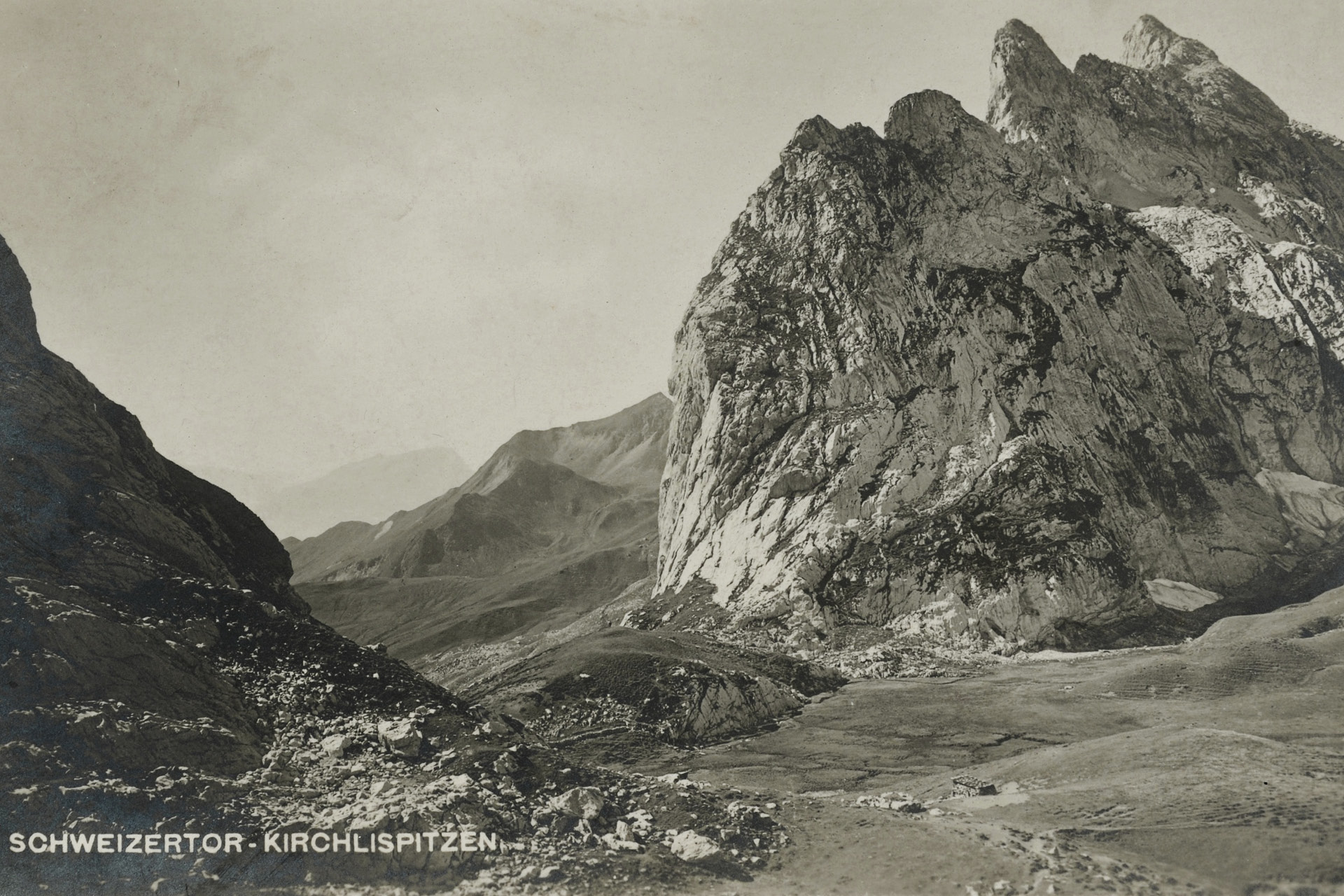Franz Weinreb> October 1, 1938
43 Franz Weinreb
Marmots at the “Swiss gate” pass. Franz Weinreb crosses the mountains
Brand, October 1, 1938
“In the hotel in Brand no one asked for documents, in the guest room four peasants were sitting playing tarot, the radio blared a few Nazi marches, then came the announcement that the betrayal of Czechoslovakia had been signed in Munich by Hitler, Mussolini, Chamberlain and Daladier. (...) The thought that now my fate, but also that of Europe, would be decided depressed me.”
Franz Weinreb, who links his fate with that of Europe, was born in Vienna in 1893, the son of Hermine Weinreb, a reformist educator. As a socialist politician, he was part of the leadership circle of the Republican Protection League, the “Schutzbund”, in the last years of the First Republic. In 1934, he withdrew from public life under the conditions of the fascist regime. But in 1938 the only option left to him was to flee, and in September he set off. He gets as far as Bludenz by train. Mountain tours in the Brandnertal, two decades earlier, have remained in his memory. There he wants to try to get to Switzerland.
“At 2 o'clock in the morning I got ready. The Goiserer boots and the pick carefully in hand, I crept on socks to the gate. (...) At the first dawn, I began the steep ascent to Lake Lünersee. (...) When I reached the Lünersee, the first rays of sun warmed my back. Smooth as a mirror it lay there, on the distant shore the familiar Douglas cabin. Its door was wide open and as I came closer I saw a young lad packing away dishes. With ‘Grüß Gott’ and palpitations I entered, fearing the usual ‘Heil Hitler’. But to my delight it came back ‘Grüß Gott. Ah, you are here early.’ (...) I wrote a postcard to my wife – only her first name on the address – and left the friendly innkeeper with a hearty ‘Vergelts Gott’, because he would not take payment. Then I walked along the border towards the Swiss gate (...).
Already from a distance I saw a bunker on the pass with loopholes in all the walls. Again my heart began to beat violently. I approached cautiously, prepared at any moment for the ‘Halt! Stop! Otherwise they will shoot!’ But nothing moved. Looking around, I saw the Swiss border stone a few meters away and a sign next to it. ‘Passage is strictly forbidden here’. Since this seemed to be the only obstacle on my way to freedom, I was about to hurry past it when suddenly a shrill whistle sounded behind me. In a flash I dropped behind a boulder, expecting the appearance of a border guard. Suddenly the whistle blew very close on the right and again on the left. Already I feared to have hallucinations from excitement, there I saw a marmot sticking its head out of a hole in the ground and warning its little people of the presence of the stranger. Bursting into a raucous laughter, I jumped up and after a few steps was on Swiss soil.”[1]
Weinreb is soon stopped by a farmer and delivered to the police post of Schiers. The policeman of the local post sends him to Chur – but from there Weinreb is almost deported back to the German Reich by the captain of the cantonal justice and police department.
His ticket to Paris and a call to an acquaintance in Solothurn, who vouches for Weinreb, finally convinces the official. Weinreb is allowed to stay in Solothurn until he can continue his journey to France. He wants to emigrate to Australia with his family. There is no longer a safe haven for him in Europe.
Mixed news arrives from Vienna on November 10. His wife tells him on the phone that the entry permit from Canberra has indeed arrived. And on the last evening, “friends” had unexpectedly arrived who had invited him on a “trip” to the Munich area. Weinreb knows what this means: he has escaped arrest and deportation to Dachau. He finally reaches Paris on New Year's Day, and soon catches up with his family.
On February 21, they board the freighter “Meerkerk” in Rotterdam, which is to take them to Australia. Many years later, in 1978, Franz Weinreb writes down his memoirs, under his new name Frank Vanry. In 1983, they are published in Vienna under the title “Der Zaungast”, the onlooker.
[1] Frank Vanry (Franz Weinreb), Der Zaungast. Lebenserinnerungen (= Materials on the Labour Movement 27). Vienna 1983 p. 233-235.
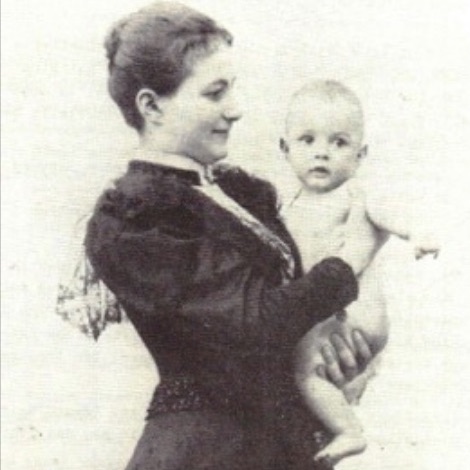
Hermine and Franz Weinreb, 1894
Source: Red Vienna. Web Encyclopedia of Viennese Social Democracy. http://www.dasrotewien.at/seite/weinreb-hermine
43 Franz Weinreb
Marmots at the “Swiss gate” pass. Franz Weinreb crosses the mountains
Brand, October 1, 1938
“In the hotel in Brand no one asked for documents, in the guest room four peasants were sitting playing tarot, the radio blared a few Nazi marches, then came the announcement that the betrayal of Czechoslovakia had been signed in Munich by Hitler, Mussolini, Chamberlain and Daladier. (...) The thought that now my fate, but also that of Europe, would be decided depressed me.”
Franz Weinreb, who links his fate with that of Europe, was born in Vienna in 1893, the son of Hermine Weinreb, a reformist educator. As a socialist politician, he was part of the leadership circle of the Republican Protection League, the “Schutzbund”, in the last years of the First Republic. In 1934, he withdrew from public life under the conditions of the fascist regime. But in 1938 the only option left to him was to flee, and in September he set off. He gets as far as Bludenz by train. Mountain tours in the Brandnertal, two decades earlier, have remained in his memory. There he wants to try to get to Switzerland.
“At 2 o'clock in the morning I got ready. The Goiserer boots and the pick carefully in hand, I crept on socks to the gate. (...) At the first dawn, I began the steep ascent to Lake Lünersee. (...) When I reached the Lünersee, the first rays of sun warmed my back. Smooth as a mirror it lay there, on the distant shore the familiar Douglas cabin. Its door was wide open and as I came closer I saw a young lad packing away dishes. With ‘Grüß Gott’ and palpitations I entered, fearing the usual ‘Heil Hitler’. But to my delight it came back ‘Grüß Gott. Ah, you are here early.’ (...) I wrote a postcard to my wife – only her first name on the address – and left the friendly innkeeper with a hearty ‘Vergelts Gott’, because he would not take payment. Then I walked along the border towards the Swiss gate (...).
Already from a distance I saw a bunker on the pass with loopholes in all the walls. Again my heart began to beat violently. I approached cautiously, prepared at any moment for the ‘Halt! Stop! Otherwise they will shoot!’ But nothing moved. Looking around, I saw the Swiss border stone a few meters away and a sign next to it. ‘Passage is strictly forbidden here’. Since this seemed to be the only obstacle on my way to freedom, I was about to hurry past it when suddenly a shrill whistle sounded behind me. In a flash I dropped behind a boulder, expecting the appearance of a border guard. Suddenly the whistle blew very close on the right and again on the left. Already I feared to have hallucinations from excitement, there I saw a marmot sticking its head out of a hole in the ground and warning its little people of the presence of the stranger. Bursting into a raucous laughter, I jumped up and after a few steps was on Swiss soil.”[1]
Weinreb is soon stopped by a farmer and delivered to the police post of Schiers. The policeman of the local post sends him to Chur – but from there Weinreb is almost deported back to the German Reich by the captain of the cantonal justice and police department.
His ticket to Paris and a call to an acquaintance in Solothurn, who vouches for Weinreb, finally convinces the official. Weinreb is allowed to stay in Solothurn until he can continue his journey to France. He wants to emigrate to Australia with his family. There is no longer a safe haven for him in Europe.
Mixed news arrives from Vienna on November 10. His wife tells him on the phone that the entry permit from Canberra has indeed arrived. And on the last evening, “friends” had unexpectedly arrived who had invited him on a “trip” to the Munich area. Weinreb knows what this means: he has escaped arrest and deportation to Dachau. He finally reaches Paris on New Year's Day, and soon catches up with his family.
On February 21, they board the freighter “Meerkerk” in Rotterdam, which is to take them to Australia. Many years later, in 1978, Franz Weinreb writes down his memoirs, under his new name Frank Vanry. In 1983, they are published in Vienna under the title “Der Zaungast”, the onlooker.
[1] Frank Vanry (Franz Weinreb), Der Zaungast. Lebenserinnerungen (= Materials on the Labour Movement 27). Vienna 1983 p. 233-235.


